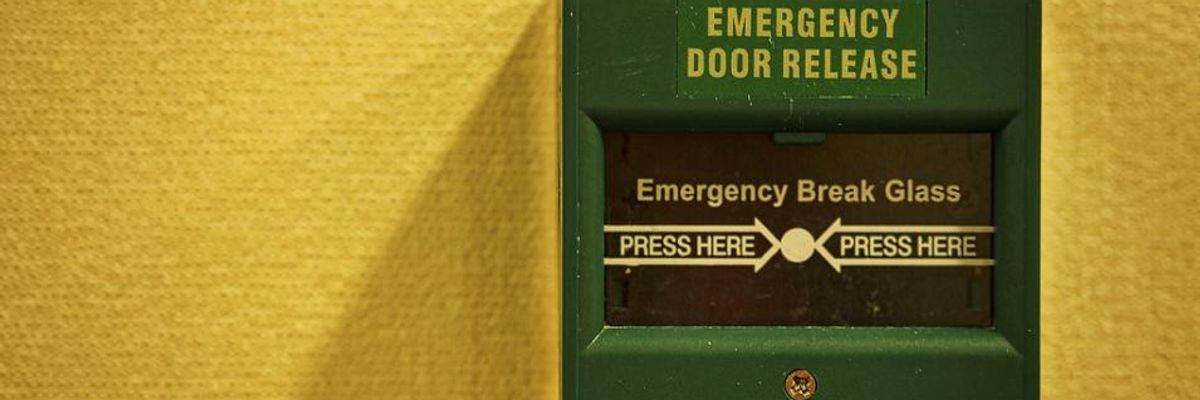Imagine that a fire has started in your house. The builders of the house were wise enough to place a fire extinguisher within easy reach, in one of those glass-doored cases that says, "Break Glass in Case of Emergency." A hammer is sitting right on top of the box.
Now imagine that you look at the hammer and fire extinguisher provided to you, but you turn away. You walk outside, and watch your house burn to the ground.
Ridiculous, right? But that is exactly what our elected leaders have been doing in response to our crisis in affording prescription drugs.
"The bottom line is that we don't have to be at the mercy of Big Pharma. We can stop this fire. Now."
Government-granted drug patents create monopolies, and monopolies lead to price-gouging. Most prescription medicines are manufactured at costs of just pennies per dose, and were discovered using taxpayer dollars. But pharma corporations use their government-granted patent monopolies to set prices that are hundreds and even thousands of times more than the cost to manufacture and distribute.
As a result, millions of Americans can't afford the medicines they need. Our house is on fire.
The good news is that Congress long ago created a "Break Glass in Case of Emergency" box. It passed laws giving the federal government "compulsory licensing" power. That means we can bypass the barriers of privately-held patents and allow the government to either directly manufacture the patented drugs or license someone else to manufacture them, usually with a limited fee paid to the patent-holder. That would guarantee we have the medicines we need at prices we can afford.
When Congress passed the Bayh-Dole Act of 1980, it endured justified criticism of the law's multi-billion-dollar giveaway to private corporations of the patent rights to government-discovered inventions. So, they inserted a safety measure into the law. It provided the executive branch with the right to "march in" and issue a compulsory license for a federally funded discovery. March-in rights are triggered if the invention is not available to the public on "reasonable terms" or if a health or safety need arises. Does this sound like anything going on right now?
Bayh-Dole's march-in rights are available only for medicines discovered with U.S. government funding. But that includes a lot of important medicines, and there are no such limitations in another federal law, 28 U.S.C SS 1498. That law empowers the federal government to use or manufacture patent-protected goods for use "by and for" the government, with only the obligation to provide reasonable compensation to the patent-holder. Courts and legal scholars have said this statute is the equivalent of eminent domain power over land: the government can step in and act because it is in the public interest.
Together, the Bayh-Dole Act, 28 U.S.C. SS 1498, and the international Agreement on Trade-Related Aspects of Intellectual Property Rights--known as TRIPS--give the U.S. President significant opportunities for broad, aggressive use of compulsory licensing to increase access to affordable medicines. It won't fix every problem we have in our dysfunctional medicines system, which is why aggressive use of compulsory licensing is just one of four proposals my colleagues and I introduce in our Reclaim Public Medicine for Public Health agenda, along with nationalizing the vaccine industry, creating public sector capacity for full-cycle pharmaceutical innovation and production of essential medicines, and codifying open science practices.
But compulsory licensing can make a big difference, and it can do so immediately. The bottom line is that we don't have to be at the mercy of Big Pharma. We can stop this fire. Now.
Compulsory licensing is not just a theoretical power. During other times of crisis, we have broken the glass and used compulsory licensing to save us from monopoly-caused crises. In the weeks after 9/11, the George W. Bush administration threatened Bayer, whose antibiotic ciprofloxacin was the only approved oral treatment for anthrax, with a compulsory license--and the price was slashed as a result. The U.S. has threatened patent-holders with compulsory licensing to reduce the price of HIV/AIDS medicines. There are dozens of other examples of the U.S. using compulsory licenses to lower prices and improve access to everything from gene therapy to truck parts.
But our recent presidents have been scared to use the emergency power sitting right in front of them. They have been unwilling to anger Big Pharma--and disrupt the steady flow of those corporations' political campaign contributions--by using the compulsory license power the law created to save us.
Meanwhile, millions of Americans are already skipping prescriptions or cutting pills in half because they can't afford their cost. Now we see the possibility of corporate price-gouging of COVID vaccines and treatments discovered with taxpayer dollars.
It doesn't have to be this way. Our house is burning, Mr. President. Break the damn glass.
This op-ed is part of an ongoing series on public medicines. View the first in the series here and the second here.

